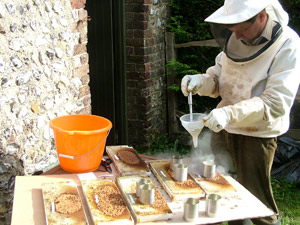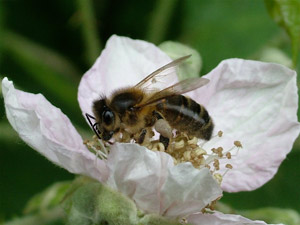- 20 July 2009
Professor awarded honey money to help bees

Scientist Norman Carreck at LASI, freezing brood cells to kill bee larvae: "Hygienic" bees act quickly to clear these cells

A honey bee forager at work on a bramble flower
University of Sussex biologist Professor Francis Ratnieks - the UK's only Professor of Apiculture - has been awarded £100,000 by the leading British honey company Rowse to research ways to help the British honey bee.
Commercial bee-keeping is in difficulty due to diseases and pests and to land use changes which have led to flowers becoming scarcer in our countryside.
The donation from Rowse Honey, the UK's biggest supplier of retail honey, is a response to the bee-keeping industry's plea for more money for research into bee health and honey productivity. British honey supplies are due to run out by Christmas, say producers.
The donation will support research at Sussex into breeding strains of "hygienic" bees, which swiftly remove infected larvae and so reduce the spread of the disease within the hive, thereby helping the hive to keep on top of disease problems.
The work will be carried out by Professor Ratnieks and his team in the UK's leading "bee lab" - the University of Sussex Laboratory of Apiculture and Social Insects (LASI), which researches all aspects of the honey bee and social insect biology.
This is the first in a series of exciting projects being proposed by Professor Ratnieks to help bees and thereby help farmers, beekeepers and the environment.
Professor Ratnieks says: "Given the current problems faced by honey bees, the donation from Rowse Honey is timely and significant. Over the next three years, it will enable us to breed our native British honey bee for greater disease resistance. We will be able to test them with help of the Bee Farmers Association (BFA), and to start providing breeder queens for British beekeepers to multiply the hygienic stock for use in their own hives."
Professor Jonathan Bacon, Dean of Life Sciences at Sussex, says: "This donation from Rowse Honey will fund work by Francis Ratnieks and his research group which is vital to improving the health of our British bees. Sussex is arguably the best located UK university for bee research; our warm South Coast weather means that the field season is maximised, many different bee-foraging habitats are within flying range of the campus and biodiversity is high."
The BFA will support the project by helping to test colonies with hygienic queens in 100 hives across Britain, to see if they are also good at making honey.
Professor Ratnieks' research has also been supported by local philanthropist, Michael Chowen, who provided the inititial funding to start the project on honeybee health.
Stuart Bailey, Chairman of Rowse Honey Ltd, says: "We are delighted that Professor Ratnieks has agreed to conduct this very necessary research. We are very impressed with his facilities and the commitment of the University of Sussex to his work. Our £100,000 will get the ball rolling, but much more needs to be spent on bee research. We totally support the British Beekeepers' Association campaign for £8 million of emergency funding from DEFRA over the next five years."
Aside from producing honey, honey bees are vitally important to the economy. They are a native British insect that pollinates around £165m worth of crops in the UK annually, as well as wild and garden flowers.
As well as being a leading authority on honeybee biology, Professor Ratnieks is also a beekeeper. He says: "The importance of the honey bee to agriculture and the environment is just one side of this amazing insect. It is also a gateway to biology - a huge range of important questions in biology, from understanding how eyes work to understanding how societies function, have been studied in this one species."
Notes for editors
- Professor Francis Ratnieks is Professor of Apiculture at the University of Sussex and is head of the Laboratory of Apiculture and Social Insects (LASI). LASI research investigates honey bees as well as social insects (ants, bees wasps) in general. LASI research dtudies both basic (how insect societies function, how they are organised, how they resolve the conflicts among individuals) and applied questions (ant and bee conservation, improved beekeeping techniques, bee health). For full details see: http://www.sussex.ac.uk/news/press-releases/media687.shtml
- Professor Ratnieks and his team are available for interview, and to demonstrate the methods that will be used in the project to breed bees with hygienic behaviour. For comment, interviews, photography and film opportunities, please contact Maggie Clune in the University of Sussex Press office on 01273 678 888, or email press@sussex.ac.uk
- Rowse Honey is the UK's leading honey brand, with 34 per cent of the UK of the UK grocery honey market. For comment and interviews, please contact Ailsa Macfarlane at Incredibullideas. Tel: 020 7940 3800; mob: 07957 601701 or visit the Rowse web site at: http://www.rowsehoney.co.uk/
- The British Beekeepers Association (BBKA), who have been campaigning to get DEFRA to fund bee research, will be lobbying Parliament and delivering a 130,000-signature petition calling for action on Wednesday 5 November. For more information about the British Beekeepers Association see: http://www.britishbee.org.uk/
- The Bee Farmers' Association of the UK represent the interests of the commercial and semi-commercial bee keepers. For more information about the BFA, see http://www.beefarmers.co.uk/
FASCINATING FACTS ABOUT THE HONEY BEE:
- Honey bees (Apis mellifera) are the world's most important pollinators. They pollinate billion worth of crops in the United States alone each year. Many crops, especially fruits, cannot develop without pollination.
- The queen bee is the mother and chief egg layer. All other females are called workers. They care for the queen's offspring, collect nectar and maintain and defend the hive. Worker bees are not sterile - they can lay eggs but these are killed by other workers. Male bees are called drones. They don't do any work. They seek out young queen bees on their mating flights.
- Worker bees tell fellow workers where to find the best sites to collect nectar and pollen from flowers by dancing - the waggle dance is the most complicated animal signal that scientists have discovered to date;
- Bees are actually hairy vegetarian wasps;
- The oldest known bee is a 100-million-year-old fossil found encased in amber in Myanmar (Burma);
- There are 17,000 known species of bee. The honey bee is just one of these species. Most bees do not live in colonies.
- Scientists believe that bees are responsible for the rich flower diversity we enjoy today, by dispersing pollen - needed for the development of seeds - from one plant to another of the same type, causing the development of new species over millions of years. Most flowering plants cannot self-pollinate, so have evolved to attract bees and other insects to do the job for them;
- Honey was the most important sweetener for food and alcoholic drinks in ancient times. So important were these activities that parents named their children after the bees. Both Deborah and Melissa mean "bee", in Hebrew and Greek respectively;
- Humans first took honey from wild bee colonies before they reared bees. The activities of beekeepers today are increasingly important as the numbers of natural pollinators in the wild continue to decline due to pollution and the destruction of habitats in the wild;
- A queen bee can lay up to 2,000 eggs a day.